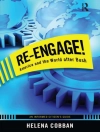In the early twenty-first century, it is now clear that religion is increasingly influential in the political realm in ways which call into question the principles and practices of secularism. The Iranian revolution of 1978-9 marked the decisive ‘reappearance’ of political religion in global politics, highlighting a major development which is the subject of this edited volume.
Addressing a highly salient and timely topic, this book examines the consequences of political interactions involving the state and religious actors in Christian, Muslim and Judaist contexts. Building on research, the basic premise of this text is that religious actors – including Islamist groups, the Roman Catholic and the Orthodox churches – pose various challenges for citizenship, democracy, and secularisation in Europe, the Middle East and North Africa (MENA). The key questions on which the book focuses are: Why, how, and when do religious actors seek to influence political outcomes in these regions?
Providing a survey of what is happening in relation to the interaction of religion and politics, both domestically and internationally, this book will be of interest to students and scholars of politics, religion, European and Middle East studies.












